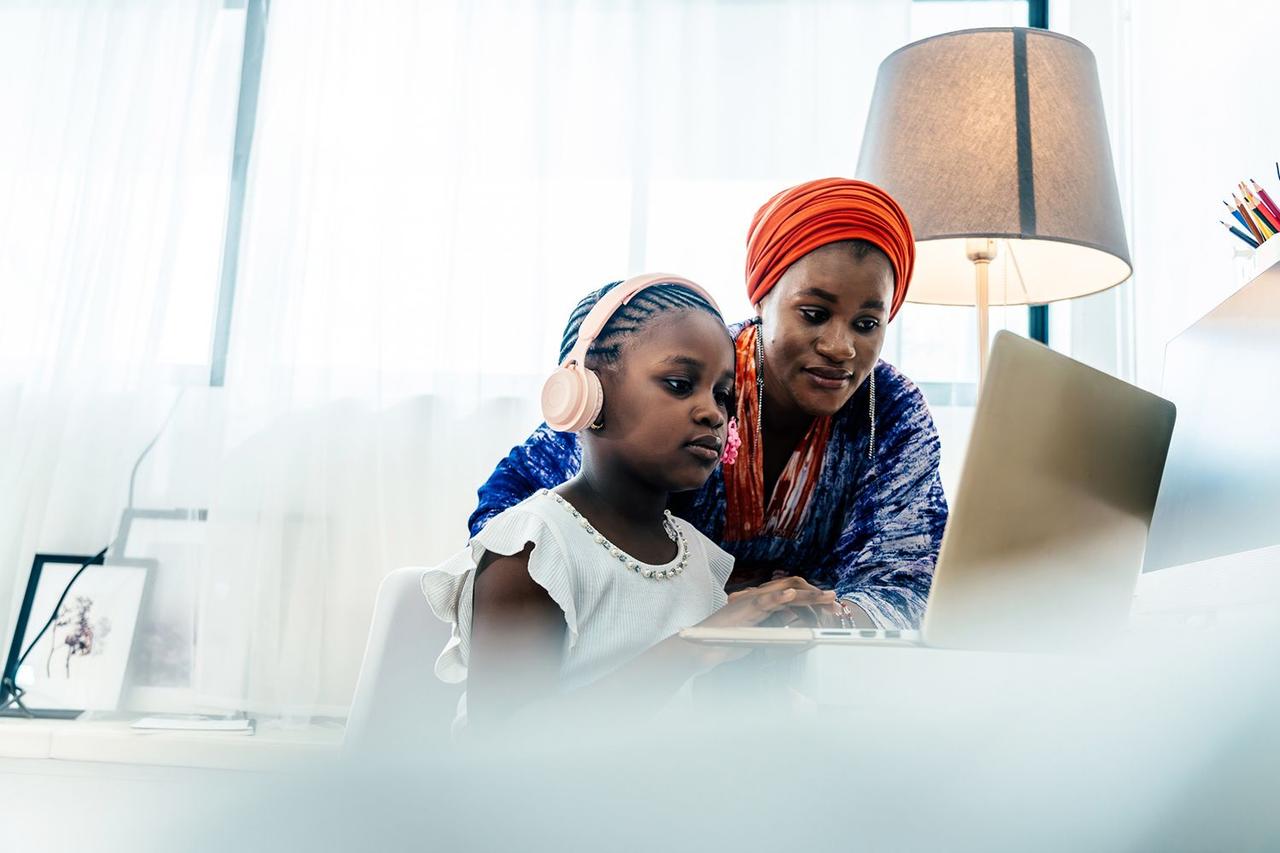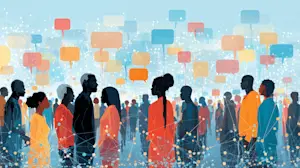African Next Voices: Bridging the AI Language Gap with Massive African Dataset
2 Sources
2 Sources
[1]
African languages for AI: The project that's gathering a huge new dataset
Artificial intelligence (AI) tools like ChatGPT, DeepSeek, Siri or Google Assistant are developed by the global north and trained in English, Chinese or European languages. In comparison, African languages are largely missing from the internet. A team of African computer scientists, linguists, language specialists and others have been working on precisely this problem for two years already. The African Next Voices project recently released what's thought to be the largest dataset of African languages for AI so far. We asked them about their project, with sites in Kenya, Nigeria and South Africa. Why is language so important to AI? Language is how we interact, ask for help, and hold meaning in community. We use it to organize complex thoughts and share ideas. It's the medium we use to tell an AI what we want -- and to judge whether it understood us. We are seeing an upsurge of applications that rely on AI, from education to health to agriculture. These models are trained from large volumes of (mostly) linguistic (language) data. These are called large language models or LLMs but are found in only a few of the world's languages. Languages also carry culture, values and local wisdom. If AI doesn't speak our languages, it can't reliably understand our intent, and we can't trust or verify its answers. In short: without language, AI can't communicate with us -- and we can't communicate with it. Building AI in our languages is therefore the only way for AI to work for people. If we limit whose language gets modeled, we risk missing out on the majority of human cultures, history and knowledge. Why are African languages missing and what are the consequences for AI? The development of language is intertwined with the histories of people. Many of those who experienced colonialism and empire have seen their own languages being marginalized and not developed to the same extent as colonial languages. African languages are not as often recorded, including on the internet. So there isn't enough high-quality, digitized text and speech to train and evaluate robust AI models. That scarcity is the result of decades of policy choices that privilege colonial languages in schools, media and government. Language data is just one of the things that's missing. Do we have dictionaries, terminologies, glossaries? Basic tools are few and many other issues raise the cost of building datasets. These include African language keyboards, fonts, spell-checkers, tokenizers (which break text into smaller pieces so a language model can understand it), orthographic variation (differences in how words are spelled across regions), tone marking and rich dialect diversity. The result is AI that performs poorly and sometimes unsafely: mistranslations, poor transcription, and systems that barely understand African languages. In practice this denies many Africans access -- in their own languages -- to global news, educational materials, health care information, and the productivity gains AI can deliver. When a language isn't in the data, its speakers aren't in the product, and AI cannot be safe, useful or fair for them. They end up missing the necessary language technology tools that could support service delivery. This marginalizes millions of people and increases the technology divide. What is your project doing about it -- and how? Our main objective is to collect speech data for automatic speech recognition (ASR). ASR is an important tool for languages that are largely spoken. This technology converts spoken language into written text. The bigger ambition of our project is to explore how data for ASR is collected and how much of it is needed to create ASR tools. We aim to share our experiences across different geographic regions. The data we collect is diverse by design: spontaneous and read speech; in various domains -- everyday conversations, health care, financial inclusion and agriculture. We are collecting data from people of diverse ages, gender and educational backgrounds. Every recording is collected with informed consent, fair compensation and clear data-rights terms. We transcribe with language-specific guidelines and a large range of other technical checks. In Kenya, through Maseno Centre for Applied AI, we are collecting voice data for five languages. We're capturing the three main language groups Nilotic (Dholuo, Maasai and Kalenjin) as well as Cushitic (Somali) and Bantu (Kikuyu). Through Data Science Nigeria, we are collecting speech in five widely spoken languages -- Bambara, Hausa, Igbo, Nigerian Pidgin and Yoruba. The dataset aims to accurately reflect authentic language use within these communities. In South Africa, working through the Data Science for Social Impact lab and its collaborators, we have been recording seven South African languages. The aim is to reflect the country's rich linguistic diversity: isiZulu, isiXhosa, Sesotho, Sepedi, Setswana, isiNdebele and Tshivenda. Importantly, this work does not happen in isolation. We are building on the momentum and ideas from the Masakhane Research Foundation network, Lelapa AI, Mozilla Common Voice, EqualyzAI, and many other organizations and individuals who have been pioneering African language models, data and tooling. Each project strengthens the others, and together they form a growing ecosystem committed to making African languages visible and usable in the age of AI. How can this be put to use? The data and models will be useful for captioning local-language media; voice assistants for agriculture and health; call-center and support in the languages. The data will also be archived for cultural preservation. Larger, balanced, publicly available African language datasets will allow us to connect text and speech resources. Models will not just be experimental, but useful in chatbots, education tools and local service delivery. The opportunity is there to go beyond datasets into ecosystems of tools (spell-checkers, dictionaries, translation systems, summarization engines) that make African languages a living presence in digital spaces. In short, we are pairing ethically collected, high-quality speech at scale with models. The aim is for people to be able to speak naturally, be understood accurately, and access AI in the languages they live their lives in. What happens next for the project? This project only collected voice data for certain languages. What of the remaining languages? What of other tools like machine translation or grammar checkers? We will continue to work on multiple languages, ensuring that we build data and models that reflect how Africans use their languages. We prioritize building smaller language models that are both energy efficient and accurate for the African context. The challenge now is integration: making these pieces work together so that African languages are not just represented in isolated demos, but in real-world platforms. One of the lessons from this project, and others like it, is that collecting data is only step one. What matters is making sure that the data is benchmarked, reusable, and linked to communities of practice. For us, the "next" is to ensure that the ASR benchmarks we build can connect with other ongoing African efforts. We also need to ensure sustainability: that students, researchers, and innovators have continued access to compute (computer resources and processing power), training materials and licensing frameworks (Like NOODL or Esethu). The long-term vision is to enable choice: so that a farmer, a teacher, or a local business can use AI in isiZulu, Hausa, or Kikuyu, not just in English or French. If we succeed, built-in AI in African languages won't just be catching up. It will be setting new standards for inclusive, responsible AI worldwide. This article is republished from The Conversation under a Creative Commons license. Read the original article.
[2]
African languages for AI: project that's gathering huge new dataset
The African Next Voices project, primarily funded by the Gates Foundation (with other funding from Meta) and involving a network of African universities and organisations, recently released what's thought to be the largest dataset of African languages for AI so far. Artificial intelligence (AI) tools like ChatGPT, DeepSeek, Siri or Google Assistant are developed by the global north and trained in English, Chinese or European languages. In comparison, African languages are largely missing from the internet. A team of African computer scientists, linguists, language specialists and others have been working on precisely this problem for two years already. The African Next Voices project, primarily funded by the Gates Foundation (with other funding from Meta) and involving a network of African universities and organisations, recently released what's thought to be the largest dataset of African languages for AI so far. We asked them about their project, with sites in Kenya, Nigeria and South Africa. Why is language so important to AI? Language is how we interact, ask for help, and hold meaning in community. We use it to organise complex thoughts and share ideas. It's the medium we use to tell an AI what we want - and to judge whether it understood us. We are seeing an upsurge of applications that rely on AI, from education to health to agriculture. These models are trained from large volumes of (mostly) linguistic (language) data. These are called large language models or LLMs but are found in only a few of the world's languages. Languages also carry culture, values and local wisdom. If AI doesn't speak our languages, it can't reliably understand our intent, and we can't trust or verify its answers. In short: without language, AI can't communicate with us - and we can't communicate with it. Building AI in our languages is therefore the only way for AI to work for people. If we limit whose language gets modelled, we risk missing out on the majority of human cultures, history and knowledge. Why are African languages missing and what are the consequences for AI? The development of language is intertwined with the histories of people. Many of those who experienced colonialism and empire have seen their own languages being marginalised and not developed to the same extent as colonial languages. African languages are not as often recorded, including on the internet. So there isn't enough high-quality, digitised text and speech to train and evaluate robust AI models. That scarcity is the result of decades of policy choices that privilege colonial languages in schools, media and government. Language data is just one of the things that's missing. Do we have dictionaries, terminologies, glossaries? Basic tools are few and many other issues raise the cost of building datasets. These include African language keyboards, fonts, spell-checkers, tokenisers (which break text into smaller pieces so a language model can understand it), orthographic variation (differences in how words are spelled across regions), tone marking and rich dialect diversity. The result is AI that performs poorly and sometimes unsafely: mistranslations, poor transcription, and systems that barely understand African languages. In practice this denies many Africans access - in their own languages - to global news, educational materials, healthcare information, and the productivity gains AI can deliver. When a language isn't in the data, its speakers aren't in the product, and AI cannot be safe, useful or fair for them. They end up missing the necessary language technology tools that could support service delivery. This marginalises millions of people and increases the technology divide. What is your project doing about it - and how? Our main objective is to collect speech data for automatic speech recognition (ASR). ASR is an important tool for languages that are largely spoken. This technology converts spoken language into written text. The bigger ambition of our project is to explore how data for ASR is collected and how much of it is needed to create ASR tools. We aim to share our experiences across different geographic regions. The data we collect is diverse by design: spontaneous and read speech; in various domains - everyday conversations, healthcare, financial inclusion and agriculture. We are collecting data from people of diverse ages, gender and educational backgrounds. Every recording is collected with informed consent, fair compensation and clear data-rights terms. We transcribe with language-specific guidelines and a large range of other technical checks. In Kenya, through Maseno Centre for Applied AI, we are collecting voice data for five languages. We're capturing the three main language groups Nilotic (Dholuo, Maasai and Kalenjin) as well as Cushitic (Somali) and Bantu (Kikuyu). Through Data Science Nigeria, we are collecting speech in five widely spoken languages - Bambara, Hausa, Igbo, Nigerian Pidgin and Yoruba. The dataset aims to accurately reflect authentic language use within these communities. In South Africa, working through the Data Science for Social Impact lab and its collaborators, we have been recording seven South African languages. The aim is to reflect the country's rich linguistic diversity: isiZulu, isiXhosa, Sesotho, Sepedi, Setswana, isiNdebele and Tshivenda. Importantly, this work does not happen in isolation. We are building on the momentum and ideas from the Masakhane Research Foundation network, Lelapa AI, Mozilla Common Voice, EqualyzAI, and many other organisations and individuals who have been pioneering African language models, data and tooling. Each project strengthens the others, and together they form a growing ecosystem committed to making African languages visible and usable in the age of AI. How can this be put to use? The data and models will be useful for captioning local-language media; voice assistants for agriculture and health; call-centre and support in the languages. The data will also be archived for cultural preservation. Larger, balanced, publicly available African language datasets will allow us to connect text and speech resources. Models will not just be experimental, but useful in chatbots, education tools and local service delivery. The opportunity is there to go beyond datasets into ecosystems of tools (spell-checkers, dictionaries, translation systems, summarisation engines) that make African languages a living presence in digital spaces. In short, we are pairing ethically collected, high-quality speech at scale with models. The aim is for people to be able to speak naturally, be understood accurately, and access AI in the languages they live their lives in. What happens next for the project? This project only collected voice data for certain languages. What of the remaining languages? What of other tools like machine translation or grammar checkers? We will continue to work on multiple languages, ensuring that we build data and models that reflect how Africans use their languages. We prioritise building smaller language models that are both energy efficient and accurate for the African context. The challenge now is integration: making these pieces work together so that African languages are not just represented in isolated demos, but in real-world platforms. One of the lessons from this project, and others like it, is that collecting data is only step one. What matters is making sure that the data is benchmarked, reusable, and linked to communities of practice. For us, the "next" is to ensure that the ASR benchmarks we build can connect with other ongoing African efforts. We also need to ensure sustainability: that students, researchers, and innovators have continued access to compute (computer resources and processing power), training materials and licensing frameworks (Like NOODL or Esethu). The long-term vision is to enable choice: so that a farmer, a teacher, or a local business can use AI in isiZulu, Hausa, or Kikuyu, not just in English or French. If we succeed, built-in AI in African languages won't just be catching up. It will be setting new standards for inclusive, responsible AI worldwide.
Share
Share
Copy Link
A groundbreaking project is collecting the largest dataset of African languages for AI, aiming to address the underrepresentation of these languages in current AI systems and promote inclusive technological development.

The Language Gap in AI
Artificial Intelligence (AI) tools like ChatGPT, DeepSeek, Siri, and Google Assistant have predominantly been developed by the global north and trained in English, Chinese, or European languages. This has left a significant gap in the representation of African languages in AI systems
1
.The African Next Voices project, a collaborative effort involving African computer scientists, linguists, and language specialists, has been working for two years to address this critical issue
2
.The Importance of Language in AI
Language plays a crucial role in AI development and usage. It serves as the primary medium for human-AI interaction, enabling us to communicate our needs and assess the AI's understanding. The project team emphasizes that language is not just a tool for communication but also a carrier of culture, values, and local wisdom
1
. By excluding African languages from AI models, we risk overlooking a vast wealth of human knowledge and cultural diversity.Challenges Facing African Languages in AI
The underrepresentation of African languages in AI stems from historical factors, including colonialism and policy choices that have prioritized colonial languages in education, media, and government. This has resulted in a scarcity of high-quality, digitized text and speech data necessary for training robust AI models
1
.Moreover, the development of AI for African languages faces additional challenges, such as the lack of basic language tools like dictionaries, keyboards, fonts, and spell-checkers. The rich dialect diversity and variations in orthography further complicate the process of building comprehensive datasets
2
.The African Next Voices Project
To address these challenges, the African Next Voices project has embarked on an ambitious initiative to collect speech data for Automatic Speech Recognition (ASR) in various African languages. The project, primarily funded by the Gates Foundation with additional support from Meta, involves a network of African universities and organizations
2
.Related Stories
Data Collection and Methodology
The project's approach is characterized by its commitment to diversity and ethical data collection practices:
-
In Kenya, the Maseno Centre for Applied AI is collecting voice data for five languages, representing three main language groups: Nilotic (Dholuo, Maasai, and Kalenjin), Cushitic (Somali), and Bantu (Kikuyu)
1
. -
Data Science Nigeria is focusing on five widely spoken languages: Bambara, Hausa, Igbo, Nigerian Pidgin, and Yoruba
2
. -
In South Africa, the Data Science for Social Impact lab and its collaborators are recording seven languages: isiZulu, isiXhosa, Sesotho, Sepedi, Setswana, isiNdebele, and Tshivenda
1
.
The data collection process ensures diversity in age, gender, and educational background of participants. It covers various domains, including everyday conversations, healthcare, financial inclusion, and agriculture. Importantly, all recordings are obtained with informed consent, fair compensation, and clear data-rights terms .
Implications and Future Prospects
The African Next Voices project represents a significant step towards making AI more inclusive and accessible for millions of African language speakers. By addressing the language gap in AI, the project aims to unlock the potential of AI applications in various sectors, including education, healthcare, and agriculture, for African communities
1
.References
Summarized by
Navi
Related Stories
Recent Highlights
1
Google Gemini 3.1 Pro doubles reasoning score, beats rivals in key AI benchmarks
Technology

2
Meta strikes up to $100 billion AI chips deal with AMD, could acquire 10% stake in chipmaker
Technology

3
Pentagon threatens Anthropic with supply chain risk label over AI safeguards for military use
Policy and Regulation








